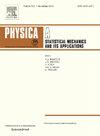针对金融时间序列的可解释人工智能方法
IF 2.8
3区 物理与天体物理
Q2 PHYSICS, MULTIDISCIPLINARY
Physica A: Statistical Mechanics and its Applications
Pub Date : 2024-10-21
DOI:10.1016/j.physa.2024.130176
引用次数: 0
摘要
我们考虑的问题是开发可解释的人工智能方法,以解释时间序列数据人工智能模型的结果,并将时间依赖性考虑在内。为此,我们扩展了沙普利-洛伦兹方法(通过构造进行归一化),使其适用于时间序列的人工智能,如神经网络和递归神经网络。我们对比特币价格时间序列(作为响应变量)和经典金融价格时间序列(作为解释变量)的应用进行了说明。首先,与传统神经网络相比,递归神经网络在准确性和稳健性方面都有更好的表现。其次,表现最好的模型表明,比特币价格主要受其滞后值的影响,从经典金融资产的角度来看,其可解释性是有限的。第三,尽管有限,但递归神经网络很好地捕捉到了传统资产对比特币价格预测的贡献。本文章由计算机程序翻译,如有差异,请以英文原文为准。
Explainable Artificial Intelligence methods for financial time series
We consider the problem of developing explainable Artificial Intelligence methods to interpret the results of Artificial Intelligence models for time series data, taking time dependency into account. To this end, we extend the Shapley–Lorenz method, normalised by construction, to Artificial Intelligence for time series, such as neural networks and recurrent neural networks. We illustrate the application of our proposal to a time series of Bitcoin prices, which acts as the response variable, along with time series of classical financial prices, which act as explanatory variables.
Three main findings emerge from the analysis. First, recurrent neural networks lead to a better performance, in terms of accuracy and robustness, with respect to classic neural networks. Second, the best performing models indicate that Bitcoin prices are affected mostly by their lagged values, and that their explainability, in terms of classical financial assets, is limited. Third, although limited, the contribution of classical assets to Bitcoin price prediction is well captured by recurrent neural networks.
求助全文
通过发布文献求助,成功后即可免费获取论文全文。
去求助
来源期刊
CiteScore
7.20
自引率
9.10%
发文量
852
审稿时长
6.6 months
期刊介绍:
Physica A: Statistical Mechanics and its Applications
Recognized by the European Physical Society
Physica A publishes research in the field of statistical mechanics and its applications.
Statistical mechanics sets out to explain the behaviour of macroscopic systems by studying the statistical properties of their microscopic constituents.
Applications of the techniques of statistical mechanics are widespread, and include: applications to physical systems such as solids, liquids and gases; applications to chemical and biological systems (colloids, interfaces, complex fluids, polymers and biopolymers, cell physics); and other interdisciplinary applications to for instance biological, economical and sociological systems.

 求助内容:
求助内容: 应助结果提醒方式:
应助结果提醒方式:


